Ignorance is Bliss
 Friday, February 10, 2012 at 8:57AM
Friday, February 10, 2012 at 8:57AM
Only 4 days away! [This gave me quite a chuckle this morning. I doubt it's real but the font is so... gah! It's serving Microsoft Word 10.0 2002 realness.]
The Film Experience™ was created by Nathaniel R. All material herein is written by our team. (This site is not for profit but for an expression of love for cinema & adjacent artforms.)
Follow TFE on Substackd
 Friday, February 10, 2012 at 8:57AM
Friday, February 10, 2012 at 8:57AM
Only 4 days away! [This gave me quite a chuckle this morning. I doubt it's real but the font is so... gah! It's serving Microsoft Word 10.0 2002 realness.]
 Thursday, February 9, 2012 at 10:02PM
Thursday, February 9, 2012 at 10:02PM 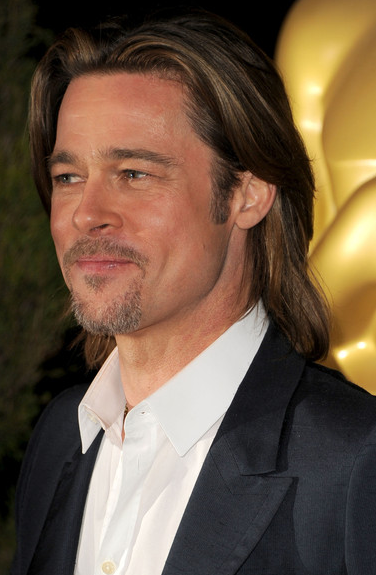 Brad to the Bone
Brad to the Bone
Yahoo Movies Another Oscar roundtable I participated in. This time I'm talking Best Actor with Thelma Adams, Sasha Stone and others. I kick it off with more Brad love.
Serious Film on Brad Pitt's winning streak. It's not just 2011.
Press Play stumps for Brad Pitt (Moneyball) for Best Actor. It's weird all the excitement seemed to be in Best Actress until just recently and then Best Actor was all anyone could talk about. Maybe because it still feels like a race?
Links
Flavorwire Ridley Scott and Michael Fassbender for a new Cormac McCarthy penned movie?
Guardian Naomi Watts signs to play Princess Diana in a bio directed by Oliver Hirschbiegel (Downfall) called Caught in Flight on the last two years of her life. I guess we need to start thinking about all the 2012 2013 Best Actress contenders.
NY Post Daniel Radcliffe not happy that Harry Potter 7.2 was not Best Picture nominated. And here I thought people had stopped thinking about that.
In Contention Happy 80th birthday for John Williams
Funny Or Die Jean Dujardin auditions for every villain role
Carpetbagger has been doing a series where they invite celebrities to fill out fake Oscar ballots (i.e. non AMPAS members. Today Tabatha Coffey. I always wanted to do this random celeb Oscar chat thing but alas, The Film Experience doesn't have the clout of The New York Times. Someday ;)
Boy Culture excavates an old Madonna interview from when she was only 34 wherein she talks about aging and knows that people will want to put her out to pasture soon. We love that she's living her ideals 19 years later and not allowing that. Given that life expectancy keeps moving up in years, you'd think civilians (who age faster than celebrities!) would stop groaning about celebrities that are "too old" to be entertaining us. I'm pretty sure in 20 years times I'll still rather see Meryl at 83 than, you know, some random 20 year old Hollywood is trying to shove down my throat. May all the talented ones keep working until they croak! This goes for the fresh ones too who are just starting out. Jessica Chastain, pace yourself. We hope to enjoy you when you're 71... if we're still alive!
Finally... the Berlinale Film Festival kicked off today with Opening Ceremonies. Here are the jurors arriving and lining up... which I snapped from the live feed.

From left to right: Director Asghar Farhadi (last year's Berlinale winner for A Separation), Actress Charlotte Gainsbourg, Director Mike Leigh, Actress Barbara Sukowa, Director Francois Ozon, Director Anton Corbijn, Writer Boualem Sansai, and Actor Jake Gyllenhaal ("Jakey!!!") who the crowd and photographers went wild for the second he stepped out of the car and onto the red.
Sundance is the first major festival of each new film year but Berlinale is always hot on its heels. Will anything as great as A Separation debut there this year? We'll soon hear.
 Berlin,
Berlin,  Best Actor,
Best Actor,  Brad Pitt,
Brad Pitt,  Harry Potter,
Harry Potter,  Jean Dujardin,
Jean Dujardin,  Madonna,
Madonna,  Oscars (11),
Oscars (11),  film festivals
film festivals  Thursday, February 9, 2012 at 3:30PM
Thursday, February 9, 2012 at 3:30PM Robert here w/ Distant Relatives, exploring the connections between one classic and one contemporary film.
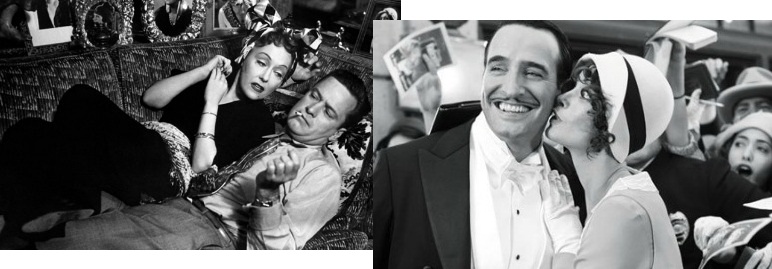
How does one begin to discuss The Artist in terms of just one distant relative? The film is a paean to all films silent-era Hollywood and enough films stretching far beyond the silent-era including Singin' in the Rain and A Star is Born, to which it owes story elements, Citizen Kane from which it borrows specific conceits and Vertigo... well, we'll leave that one alone. But I think the connection that intrigues me the most is notable not for what the two films have in common, but in how they differ.
The Artist tells the story of dashing silent film actor George Valentin and his fall from grace juxtaposed against rising talkie star Peppy Miller who, in a cruel twist of fate, is an ingenue he discovered. Sunset Blvd enters the world of former silents star Norma Desmond as discovered by aspiring screenwriter Joe Gillis, a world overgrown with bitterness, denial and impending senility.
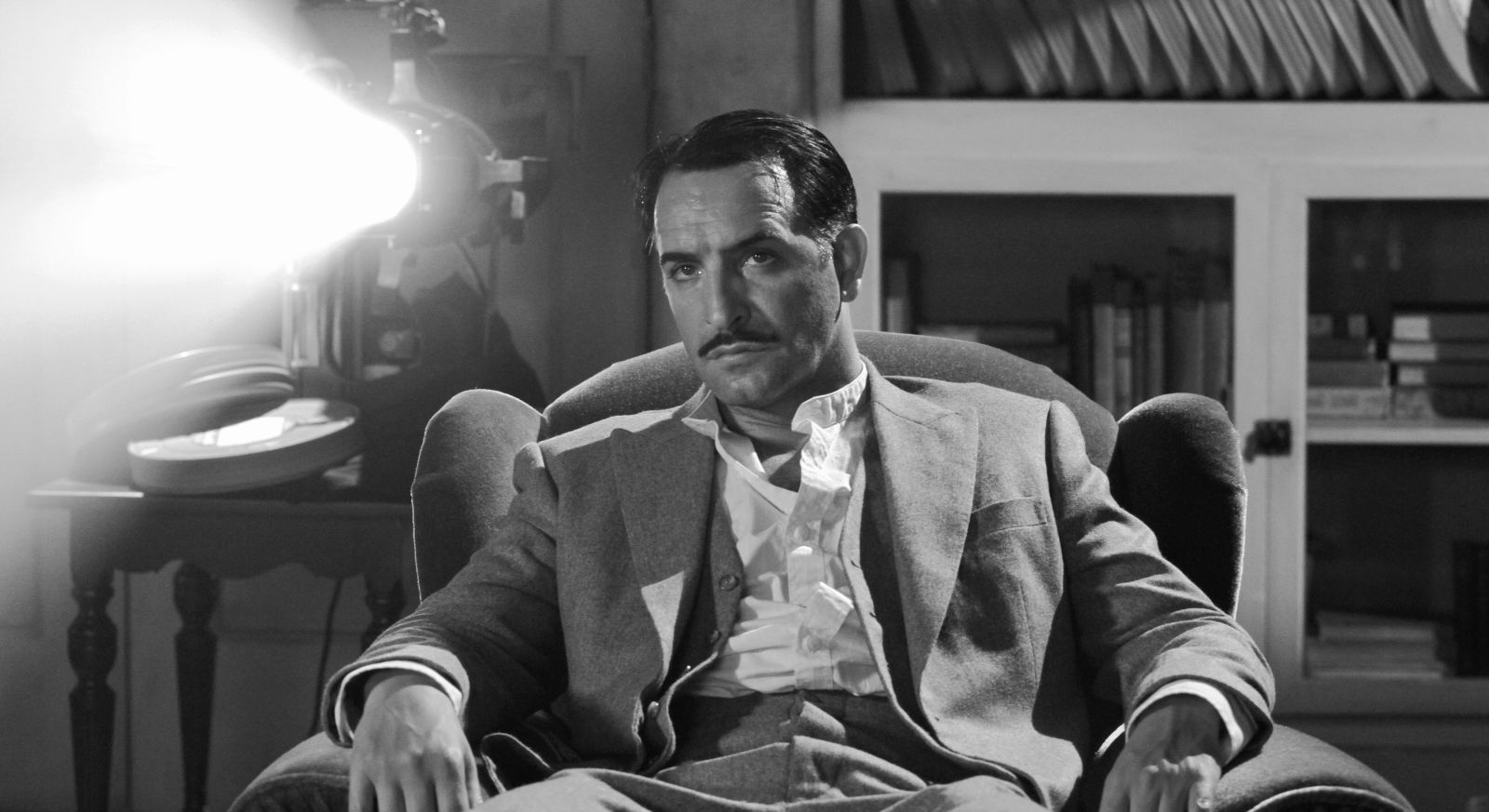
Sunset Blvd is in a way the anti-Artist. If you started with one similar concept and gave the script to a half-glass-full director and a half-glass-empty director, you'd quite possibly end up with The Artist and Sunset Blvd. The similarities are obvious enough. Both films are about silent stars whose downfalls hasten when "words, words, words" make their way into motion pictures, soon making them quite irrelevant. George Valentin and Norma Desmond suffer the same fate, and the requisite eventual drinking and depression. The only difference is, Norma's "savior" finds her many years too late.
I use the term "savior" pretty liberally here, since this is where the films' paths really start to diverge. Peppy and Joe have enough in common. They're young. They're attractive. They're eager to make it into show business. And they have the one thing that Valentin and Desmond do not: potential. Now keep in mind, that's only true as defined by their genres. In a film noir, potential is a hack and a cynic stumbling into a good idea. In a feel-good film it's the rise of a dreamer.
However, these two have polarized motives. Gillis (our hero mind you) is in it for himself. He's using Norma's help to propel his success. Peppy quite contrarily is using her success to help George. And herein lies the reason these films reach their different conclusions, not to mention the reason why one of them is on it way to the Best Picture Oscar while the other didn't win the prize.
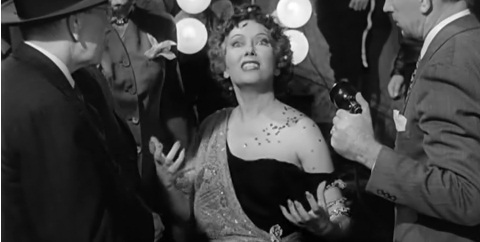
It's about appreciation. Peppy appreciates the classics, the silents, the stars. She loves them as we love them. And as our hero (if we can call her that since Valentin doesn't do anything active to save himself) this love propels her to be one of the most decent, morally unimpeachable movie characters in recent years. And then there's Joe. Joe Gillis doesn't care, and vicariously through him, nor do we, and even further than that Sunset Blvd suggests that very few do, and nowhere included in that few is anyone in show business. It's a dark, cynical accusation that no one cares about the old "wax museum" of stars whose talent built up the picture business. It's a sentiment that's not particularly easy to vote for even if it happens to lead a film that is both brilliant and in many ways, honest.
Which makes me wonder, has much changed since 1950? Certainly we now have home video, we have streaming and the internet. The brilliance of the slient era is more accessible than it's ever been, and that allows for a sizable fanbase. And what about within the world of The Artist? Valentin's discovery of Peppy originally seems like a spoonfull of irony but turns out to be uplifting cinematic karma. If she were not there to save him, would anybody? Would Valentin end up just like Norma Desmond? Would The Artist become a cautionary tale instead of an inspirational one?
The Artist was made in 2011 and takes place in the late twenties, early thirties. Sunset Blvd was made in 1950 and takes place in 1950. Therein may lie the ultimate clue to why these very similar films reach very different conclusions. Nostalgia is always inspirational. Reality, not so much.
 Distant Relatives,
Distant Relatives,  Sunset Blvd,
Sunset Blvd,  The Artist
The Artist  Thursday, February 9, 2012 at 2:00PM
Thursday, February 9, 2012 at 2:00PM Sibel Kekilli out and about in Germany

Love the 'Je T'Aime' tee-shirt. Simple, hot.
She's currently our favorite German actress and we want more after Head On (2004) and When We Leave (2009). Currently crossing fingers that the new exposure from Game of Thrones (she plays "Shae" the courtesan) will open up major doors for her.
Game of Thrones is actually doing all right by our favorite foreign actresses. Next season (two months away) The Netherlands' Carice Van Houten (Black Book) joins the cast as the frightening priestess Melisandre... The Red Lady. Here's a new gallery of photos from season 2.
I wish I liked the show more. (sigh)
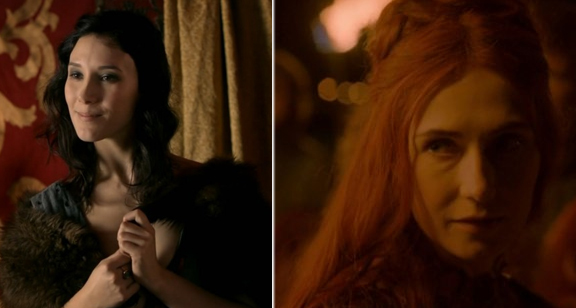 Shae (Sibel) and Melisandre (Carice)
Shae (Sibel) and Melisandre (Carice)
If anything can convince me to keep watching it's probably these two. We shall see.
 Carice Van Houten,
Carice Van Houten,  Game of Thrones,
Game of Thrones,  Germany,
Germany,  Sibel Kekilli
Sibel Kekilli  Thursday, February 9, 2012 at 12:00PM
Thursday, February 9, 2012 at 12:00PM 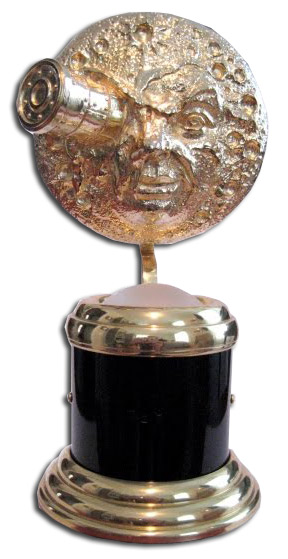 Paramount had a big night at the Visual Effects Society awards. We knew that Hugo was bound to do well given that the VES Statue is already Papa Georges friendly (pictured left). But they won in other categories too thanks to Rango and Transformers. Will all three of those movies take home prizes at the Oscars? Transformers has the biggest hurdle there in all three of its categories but especially in visual effects since its battling Rise of the Planet of the Apes. "Caesar" is probably too agile to fall prey to "The Driller"
Paramount had a big night at the Visual Effects Society awards. We knew that Hugo was bound to do well given that the VES Statue is already Papa Georges friendly (pictured left). But they won in other categories too thanks to Rango and Transformers. Will all three of those movies take home prizes at the Oscars? Transformers has the biggest hurdle there in all three of its categories but especially in visual effects since its battling Rise of the Planet of the Apes. "Caesar" is probably too agile to fall prey to "The Driller"
Visual Effects Rise of the Planet of the Apes: Dan Lemmon, Joe Letteri, Cyndi Ochs, Kurt Williams
Supporting Visual Effects Hugo: Ben Grossmann, Alex Henning, Rob Legato, Karen Murphy
Visual Effects in an Animated Feature Rango: Tim Alexander, Hal Hickel, Jacqui Lopez, Katie Lynch
Animated Character in a Live Action Feature "Caesar" Rise of the Planet of the Apes: Daniel Barrett, Florian Fernandez, Matthew Muntean, Eric Reynolds
Animated Character in an Animated Feature "Rango" Rango: Frank Gravatt, Kevin Martel, Brian Paik, Steve Walton
Created Environment in Live Action "155 Wacker Drive" Transformers: Dark of the Moon: Giles Hancock, John Hanson, Tom Martinek, Scott Younkin
Created Environment in Animated "Main Street Dirt" Rango: John Bell, Polly Ing, Martin Murphy, Russell Paul
Quick recall: I'm sure you remember Main Street in Rango since virtually all the action unfolded there. But if you need a quick memory nudge "155 Wacker Drive" is the building that took such a brutal beating in Transformers, an action sequence that they used so heavily in commercials since they correctly guessed that "The Driller" was their biggest WOW. In fact that action sequence was so memorable that it appears that Battleship wanted nothing more than to remind you of exactly that in their 'Transformers Jr.' Superbowl commercial.
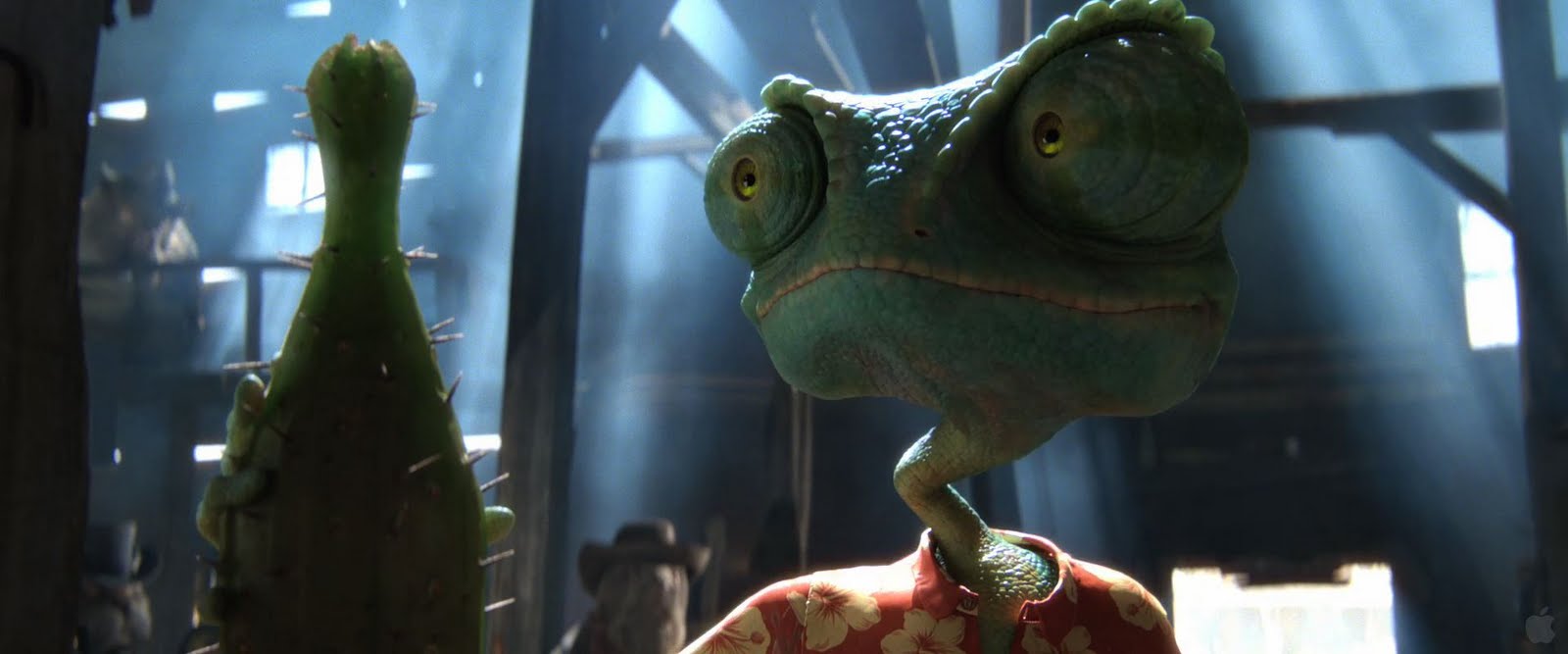 Rango in the Dirt Saloon
Rango in the Dirt Saloon
Virtual Cinematography in Live Action: Hugo: Martin Chamney, Rob Legato, Adam Watkins, Fabio Zangla
Virtual Cinematography in Animated "The Dirt Saloon" Rango: Colin Benoit, Philippe Rebours, Nelson Sepulveda, Nick Walker
Models "Driller" Transformers: Dark of the Moon: Tim Brakensiek, Kelvin Chu, David Fogler, Rene Garcia
Compositing "Skinny Steve" Captain America: The First Avenger: Casey Allen, Trent Claus, Brian Hajek, Cliff Welsh
The rest of the awards were for television and commercials. Game of Thrones, Boardwalk Empire and Terra Nova (is that cancelled or not? Confusion) took home most of the prizes. You can see a full list of winners at the VES Official Site. And just because we love it so much, and its such an actressexual fix, let us all gaze once more upon the great "Dior J'Adore" which won Visual Effects in a Live Action Commercial.
Remarkably Charlize Theron's beauty is not computer generated but an actual thing that exists in nature (Good job God!) but mixing in those famous immortals required computer assistance.
 Charlize Theron,
Charlize Theron,  Giant Fucking Robots,
Giant Fucking Robots,  Hugo,
Hugo,  Rango,
Rango,  Visual FX,
Visual FX,  commercials
commercials